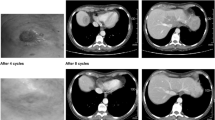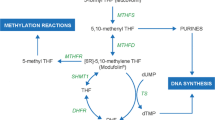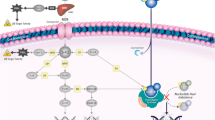Abstract
Purpose: To determine toxicities, maximally tolerated dose (MTD), pharmacokinetic profile, and potential antitumor activity of MTA, a novel antifolate compound which inhibits the enzymes thymidylate synthase (TS), glycinamide ribonucleotide formyltransferase (GARFT), and dihydrofolate reductase (DHFR). Methods: Patients with advanced solid tumors were given MTA intravenously over 10 min every 21 days. Dose escalation was based on the modified continual reassessment method (MCRM), with one patient treated at each minimally toxic dose level. Pharmacokinetic studies were performed in all patients. Results: A total of 37 patients (27 males, 10 females, median age 59 years, median performance status 90%) were treated with 132 courses at nine dose levels, ranging from 50 to 700 mg/m2. The MTD of MTA was 600 mg/m2, with neutropenia and thrombocytopenia, and cumulative fatigue as the dose-limiting toxicities. Hematologic toxicity correlated with renal function and mild reversible renal dysfunction was observed in multiple patients. Other nonhematologic toxicities observed included mild to moderate fatigue, anorexia, nausea, diarrhea, mucositis, rash, and reversible hepatic transaminase elevations. Three patients expired due to drug-related complications. Pharmacokinetic analysis during the first course of treatment at the 600 mg/m2 dose level demonstrated a mean harmonic half-life, maximum plasma concentration (Cpmax), clearance (CL), area under the curve (AUC), and apparent volume of distribution at steady state (Vdss) of 3.08 h, 137 μg/ml, 40.0 ml/min per m2, 266 μg · h/ml, and 7.0 l/m2, respectively. An average of 78% of the compound was excreted unchanged in the urine. Partial responses were achieved in two patients with advanced pancreatic cancer and in two patients with advanced colorectal cancer. Minor responses were obtained in six patients with advanced colorectal cancer. Conclusions: The MTD and dose for phase II clinical trials of MTA when administered intravenously over 10 min every 21 days was 600 mg/m2. MTA is a promising new anticancer agent.
Similar content being viewed by others
Author information
Authors and Affiliations
Additional information
Received: 20 October 1998 / Accepted: 30 March 1999
Rights and permissions
About this article
Cite this article
Rinaldi, D., Kuhn, J., Burris, H. et al. A phase I evaluation of multitargeted antifolate (MTA, LY231514), administered every 21 days, utilizing the modified continual reassessment method for dose escalation. Cancer Chemother Pharmacol 44, 372–380 (1999). https://doi.org/10.1007/s002800050992
Issue Date:
DOI: https://doi.org/10.1007/s002800050992




